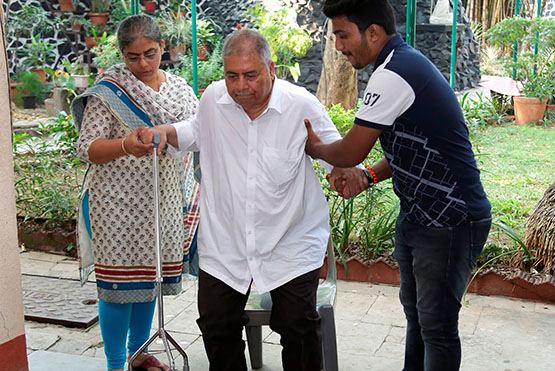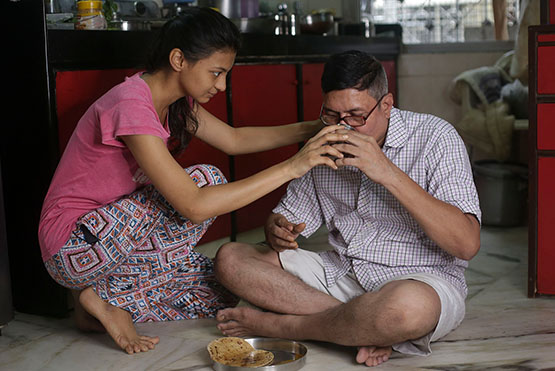- Homepage
- CARING FOR PARKINSON’S



CAREGIVING FOR PARKINSON’S
You are visiting this section, because you have a loved one who is dealing with Parkinson’s disease. With the following section, we aim to take you through the various aspects of caregiving and why it is important to care for yourself.
WHO ARE CAREGIVERS?
In most scenarios, caregiving is unconditional. It takes many forms and most times we don’t even realize that we are someone’s caregivers; as somebody’s wife, husband, son, daughter, mother, father or a friend. We realize we are helping our loved one, but we don’t think of ourselves as “caregivers”.
So, who are caregivers?
The answer is- most of us, at some point in our lives! While some people rely on paid caretakers, most rely on family assistance. Do you identify with any of the following responsibilities?
Are you the person who helps your loved one take a shower, get dressed and/or take their medicines?
Are you the person who helps your loved one in and out of bed, with physical therapy, injections, feeding tubes or other medical procedures?
Are you the person who spends time handling a crisis at work while making plans to take better care of your loved one?
If the answer to any one of these questions is yes, then you are a caregiver.
COMING TO TERMS WITH THE DIAGNOSIS
A diagnosis of Parkinson’s can be a life-changing event not only for the person who is
diagnosed but for their family and friends as well. As a caregiver, you will need to give
yourself some time to come to terms with the range of emotions you may experience.
You may initially find it difficult to believe that your healthy loved one can have Parkinson’s. You may worry about what the illness holds for your loved one and you, you may fear losing your loved one and sometimes you might even hold yourself responsible for the diagnosis (although that is never the case as Parkinson’s has no known cause).
The diagnosis does bring about changes in the lives of the Person with Parkinson’s (PwP) and his/her family. There will be changes in roles and duties. For example, as a caregiver, you may have to be more involved in making family decisions, assuming responsibility for additional household activities, managing the symptoms and treatment of the PwP, etc. Knowing what challenges you may face can help you be prepared, as you go on this journey.
CHALLENGES YOU MAY FACE
Due to Parkinson’s and its symptoms, PwPs may experience certain emotional and
behavioral disturbances that can be difficult to manage. Some of these can include the
following:
Anger and Stubbornness: PwPs may feel angry due to their symptoms as well as a sense of dependency that might develop. For example, the difficulty in doing activities which were previously done with ease can create a lot of frustration.
Low mood:This can be a result of Parkinson’s and the challenges it brings or it could be a symptom of Parkinson’s itself. For example, it could include lack of interest in activities and feelings of sadness.
Impulsive behavior: These are recurrent, unusual behaviors that your loved one may engage in that interfere with daily living. Your loved one may not be fully aware of these behaviours and may find themselves unable to reduce or stop them despite being aware of the harmful consequences. For example, he/she may now have a tendency to binge eat a lot more than before.
Hallucinations refer to seeing or hearing things that are not present in that moment and
Delusions refer to false beliefs that may not have any evidence. For example, a hallucination would be seeing a tiger walking around the house. A delusions would be a person believing that his/ her family wants to poison him/ her.
Strained relations amongst family members: The challenges that come along with Parkinson’s may affect the relationship you share with your loved one, whether you are the patient’s spouse, child or friend.
Just like you as a caregiver are coming to terms with the diagnosis, your loved one with Parkinson’s may also be going through the same. It is therefore important for you to know about these disturbances and how you can manage them effectively.
CARING FOR YOURSELF
Being able to cope with everyday tasks and the stresses of care giving is an art in itself. In
order to continue with our care giving, it is important that we learn to care for ourselves as well.
With the changing roles, 24/7 responsibilities, fluctuating feelings of care, guilt, anger, one begins to ignore one’s self- care and interests. This could ultimately lead to caregiver distress and burnout where you may feel physically, emotionally and mentally exhausted. As a result, this affects your own health and subsequently your efficiency as a caregiver.
Being proactive in your own care BEFORE it becomes a necessity can prevent this state of distress. So STOP! Take a day out for yourself!
Llardo and Rothman (1999) talk about some tips referred to as the “Caregiver’s STOP Sign” to help you concurrently focus on yourself during the care giving process.
CAREGIVER BURNOUT
Whether you became a caregiver gradually or whether you suddenly found yourself in the role, being a caregiver brings an experience of emotions like anxiety, guilt, anger, frustration, and sadness to name a few. Often, dealing with these emotions makes us feel extremely uncomfortable, especially guilty and judgmental about ourselves. However, avoiding these nagging emotions and burying them is as good as designing a ticking time-bomb.
As you can imagine, this may create a series of other problems which affects you, your PwP and your other family members. Therefore, what is important to understand is that it is NORMAL to go through such negative feelings. At the end of the day, caregivers are also human beings with emotions, expectations and hopes. All your feelings, good and bad, are as valid and important as the PwP’s emotions. As much as you might want to avoid them or bury them, it is imperative that you seek help and learn to manage such emotions.
YOUR COMPREHENSIVE GUIDE TO MANAGING PARKINSON’S
It is important to bear in mind that Parkinson’s is a part of you and your family
member’s life, but not life itself.
These are some things to keep in mind that will help in making this journey easier for you and your loved one:
Knowledge about Parkinson’s, its signs and symptoms, treatment and management will help you cope with the diagnosis and feel prepared for possible challenges that your loved one may face. No two people will have the same signs and symptoms. The symptoms and their progression for each PwP vary.
Click here to visit our section on Knowing Parkinson’s.
Being a source of support. Just as it is difficult for you to accept that your loved one has Parkinson’s, it is difficult for him/her too. Therefore, they need your patience and support to come to terms with the diagnosis and take control of the illness. Give your loved one the time and space to absorb the diagnosis but at the same time don’t let him/ her slip into isolation and depression.
Open and honest communication among family members is of utmost importance. For example, your loved one might not be comfortable in disclosing the diagnosis to friends and work colleagues right away. Discuss with your loved one whether they would like others to know, and what details they would be comfortable to share. Respecting their decision and need for confidentiality is very crucial.
Caring for yourself is equally important. Dealing with a chronic, progressive condition like Parkinson’s can take a significant toll on a person. Managing your changing roles at home and/or work, plus the responsibilities of caring for a PwP might make you experience a multitude of emotions, all at the same time. Therefore, this goes without saying that such feelings need to be dealt with.
Click here to read our section on Caring for Yourself.
Know your healthcare team. It is important to be aware of the Multidisciplinary Team of Health Care Professionals who play an integral role in the care and treatment of PwPs as well as their caregivers. These professionals offer support and practical tips in areas which you as a caregiver may find difficult to manage. This also aids in the improvement in quality of life.
COPING WITH BURNOUT
Being armed with information while you are caregiving is half the battle won. When you
know about certain things related to caregiving, you know what to expect and therefore know what to do about it. As Parkinson’s progresses, your role as a caregiver evolves and there may come a point where you feel overwhelmed or burnt out. This is a part of the journey itself and more normal than you may think. The good news is this can be managed and dealt with.
LOSING YOUR LOVED ONE
Losing someone close to you is extremely distressing. That loss also signifies the end of your caregiver role which may create feelings of emptiness. You may experience a range of emotions like shock, disbelief, sadness, anger and guilt. You may feel guilty about things you did or didn’t do, say or didn’t say. After the demise of your loved one, it may be difficult to come to terms with the loss of not only your family member but also your caregiver role. When you are ready, it is helpful to look at rebuilding your life.






